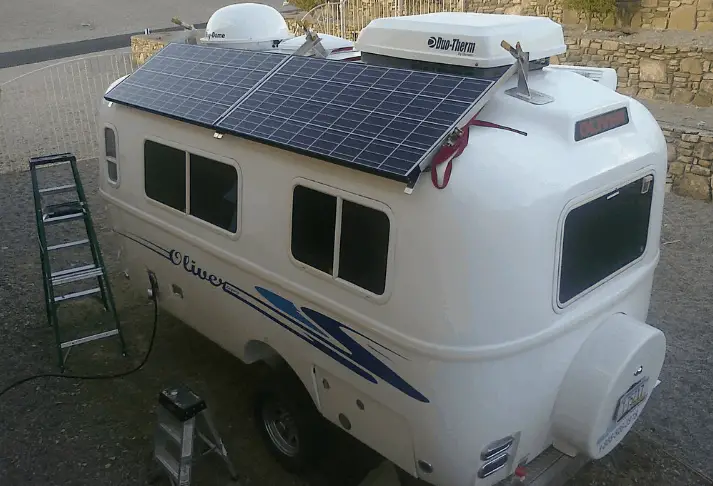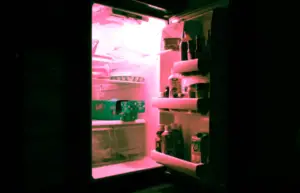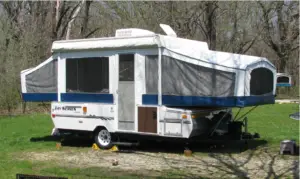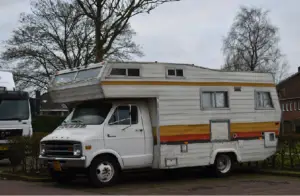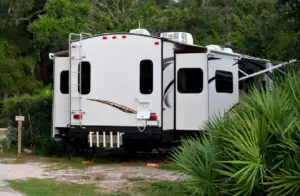Solar energy is free and that’s what makes many people think if they can use solar panels in their RV. Having solar can be great, its free (after the initial cost) and easy to use.
But, a lot of people have this basic misunderstanding about solar panels for RV. IN this article I will cover the most basic questions about using solar in RV.
Can you put solar panels on an RV?
The question should actually be how and where on the RV is the best place to put the solar panels for the best chance of getting the most energy from the sun.
And yes, it can definitely be installed on an RV.
But, before you get solar you should know its limitations and how it works. A lot of people have this in their mind that it would produce the energy that can directly be used to power appliances like AC or refrigerator.
That’s not how it works. The solar itself is used to produce the current which is then stored in a battery. Lets find out more.
Solar Panels Working In An RV
Let’s put it simply, solar panels get their power from the rays of the sun.
Assuming you have no idea how the solar power works in an rv let me take you through how the system works.
The two main parts needed to make your solar panels operational is a controller and an inverter to turn solar-generated energy into wattage or usable electricity.
The controller’s main function is to regulate the energy conveyance to the battery as to not overcharge. The inverter’s main function is to convert the energy from DC to AC to enable you to power all your appliances.
1. The solar panels receive the sunlight during day time (more sophisticated ones can absorb the light even when the sun isn’t that shinning).
2. These panels convert the sun energy into electric current which is then passed through a converter. The converter controllers how much energy/current it passes to the storage device (DC battery)
3. The battery stores the charge as DC power which can be used to power your appliances even when the sun isn’t hitting the solar panels.
So, its not that when the sun isn’t their at night you wont have solar energy for your use. The point here is its the batteries that will be powering your RV appliances. They can give direct DC power as well as AC via an alternator.
This makes your little electric grid system in your RV. Just think of the system and everything should be clear to you.
One can buy each of these components separately and it also comes as a solar kit. Its good to go with a solar kit rather than assembling.
Best Way to Charge RV Batteries : The solar power energy used to charge batteries is the best as compared to other flash charging. The batteries are normally made to charge in steady and slow manner. Therefore this can be a good to enhance the life of your RV batteries as well.
So, when you turn on the switch, electricity powers whatever device you’re using. Like, on a hot day, you’ll be in solar panel heaven. On a very hot day, you’ll get solar panels on power.
As you can see it depends on the sun’s generosity to take advantage of nature’s many benefits to us. When it is correctly connected to the RVs electrical circuitry, it can power any electrically powered appliance found in the home to run in an RV.
After proper installation, you would use it the same way you use it in a brick and mortar home. And the best part of it all is there won’t be any electrical bill sitting and waiting for you at month-end.
The upfront investment will be a little hefty, but getting the added benefit of no bill to pay, makes the acquisition of solar panels for your RV oh so worth it.
How many solar panels you will need for an RV?
The number of panels you’ll need will depend on how much or how little solar power you will use. As well as the size of your trailer and the electrical output it generates.
Finding out how many solar panels you need can be tough job initially. It also depends on your usage.
Typically a 100 Watt panel can produce around 6 amp per hour on a bright sunny day. Which then means you can have upto 30-32 amps hours produced every day.
So, if your consumption is 30 amps or less per day then you should be fine with one solar pannel. If its more then add more pannels.
If you have high needs then its going to be more than 30 amps for sure.
You also have to look at the battery by the way. It is going to store this charge for you. If you have 100 amps batteries then you can draw around 50% out of it. Having two batteries can work great.
You watts hour consumption will depend on the number of appliances you run.
Various appliances in RV and their Wattage requirements.
| Appliance | Watts | Hours of Usage | Power Consumption |
| AC | 1200W | 8 | 9600WH |
| Fridge | 250W | 24 | 6000 WH |
| TV | 150W | 4 | 600 WH |
| Microwave | 800W | 1 | 800 WH |
| Lights | 40W | 8 | 320 WH |
| Heater | 500W | 4 | 2000 WH |
Installing The Solar Panels
Installing solar panels might sound as easy as fixing a couple of panels on the roof of your RV. But if you take into account the delicate and intricate electrical wiring, you’ll soon notice how much more involved it really is.
But, that shouldn’t be any worry to you if you are a DIY’er and know your tools. If that’s not the case, employ the services of a professional to get your newly installed solar panels up and running in no time. It is, however, easier to maintain and look after once it’s ready to use.
Installation : With today’s tools, nails, screws, and workmanship, putting a few solar panels on the roof of an RV shouldn’t be a difficult job at all. On the contrary, it should be seen as a nice and fun modification project to undertake.
Do It Yourself : And, in fact, if you are a DIY’er, doing the installation yourself is definitely possible. Just make sure you consult with an expert to ensure everything is properly positioned and fixed.
Safety is a high priority. Because you don’t want any fires or medical emergencies to spoil your fun on a remote camping trip, where people and resources are limited.
After all, an RV goes hand in hand with relaxation and getting away from all the hustle and bustle of everyday life.
Get an Expert : So to keep with that theme, do it yourself, or if it is too technical for you, employ an expert to reap the best benefit from it and also to get it right the first time around.
How many solar panels to run RV air conditioner
Can you run RV air conditioner on Solar?
Technically it may be possible but its not practical when you are RVing. The soalr pannels in your RV store the charge in batteries and you would need too much battery power to have this setup.
So, its not a good idea to run AC on solar, instead you should be using an generator for this. Generator would give you AC current which is needed to run the air conditioner in your camper.
Can you run RV refrigerator using solar
RV Refrigerators that are smal can be run using solar. HOwvere, even that can be a difficult thing if you dnt have good batteries. Home fridges use hundred of watts and you have abig one in your RV then that is not practical.
But, if you have that less than 100 watts narcold or dometic one then you can use the soalr power via an alternator. SO how much solar panels then to run the RV fridge?
Well, again it will depend on how many hours of usage and the watts consumption by the fridge.
Cost To Get RV Solar
The initial costs of solar panels can run-up quickly, given your personal preferences. There is a myriad of options available to you that will fit your style and budget.
However, keep in mind that installation costs can ramp that amount up even faster. And because it’s completely customizable, and if money is no object you can really splurge and go overboard.
The costs can be anywhere from a few hundred dollars all the way up to a couple of thousand dollars.
At the end of the day how much it costs shouldn’t be the deciding factor in whether you should install solar panels or not. Should that be the case, say goodbye to the fun and good times and simplification that comes with solar panels on your RV.
But, it really comes down to it being a necessity. Because who wants to constantly load and unload that noisemaker generator and smell of lithium propane all day long.
When it comes down to it, solar panels might not be the strongest power source you can employ, but it’s definitely the most practical because the moment you arrive at your desired destination, it’s ready to go.
Want a cup of tea, just flick a switch. Want a hot shower, just turn the tap and voila, hot water in an instant.
Pros of using solar in the RV
The pros definitely outweigh the cons.
- To offset the hefty upfront costs and perhaps the most standout feature of RV solar panels is its free electricity for life.
Now that’s an investment that keeps on giving. Let’s point out a few key benefits:
- Once-off payment in exchange for an unlimited power supply.
- Easy and low-cost maintenance.
- Environmentally friendly.
- Smell and noise-free.Compatible with all household appliances.
Cons of using solar in the RV
With all good things in life, there must be some cons as well, just to keep the balance. Let’s have a look at a few of them:
- Hefty upfront installations cost.
- Weakest source of energy.
- It needs adequate sunlight to operate at full capacity.
- Very sensitive to small amounts of dust that can shorten the lifespan of your solar panels if not cleaned regularly.
Depending on your RVs power output you might get the full benefit of enough energy to fuel your appliances.
In Conclusion
Getting solar panels installed on the roof of your RV will provide you with power for years to come and serve you well. It will make an excellent travel companion you can count on for all energy and power-related matters. Solar power can be of great help while boondocking.
And all it asks for is that it gets the needed sunlight to be fully operational and give you your money’s worth.
So go and get some solar panel modification done on your RV and your traveling and camping days will be pleasurable and fun.

